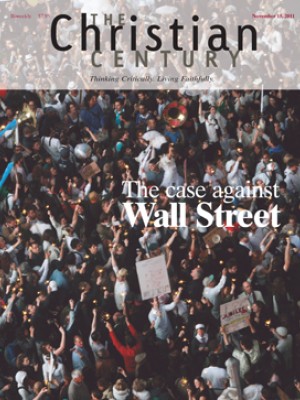The disconnect between church and secular calendars may never be greater than on the first Sunday in Advent. The irony is that both ostensibly share the same goal: preparing the world for Christmas.
The commercial world is using every medium possible to hawk its urgent message. Our mailboxes, newspapers, television and radio stations, e-mail in-boxes and web pages overflow with one unanimous appeal: buy gifts now. Buy the gifts that your friends or your loved ones need or want. Buy gifts because you are expected to do so and to prove you love your family, admire your boss, appreciate your colleagues, are sensitive to your in-laws, generous toward your employees, and respect your children's teachers. Buy to show your patriotism. I am no economist, but I suspect that the urgency of the commercial message is in inverse proportion to the health of the market.
It always feels like a lost cause for the church to try to compete with the sheer volume of advertising—especially on the first Sunday of Advent. The eschatological message of the gospel strikes a dark and utterly dissonant chord: "But in those days, after that suffering, the sun will be darkened, and the moon will not give its light, and the stars will be falling from heaven, and the powers in the heavens will be shaken. Then they will see 'the Son of Man coming in clouds' with great power and glory" (Mark 13:24–25). It's a hard sell when the malls are filled with "Rudolph the Red-Nosed Reindeer" and "Here Comes Santa Claus."
Read our latest issue or browse back issues.
Some years I go for it anyway. But this year, I'm capitalizing on the fact that the first Sunday in Advent is lodged between Thanksgiving and the start of December. I'm reaching for the reminder that our eschatological hope begins with gratitude for what we have already been given. As Paul says:
I give thanks to my God always for you because of the grace of God that has been given you in Christ Jesus, for in every way you have been enriched in him, in speech and knowledge of every kind—just as the testimony of Christ has been strengthened among you—so that you are not lacking in any spiritual gift as you wait for the revealing of our Lord Jesus Christ. (1 Cor. 1:4–7)
Paul invites us to consider that our ultimate hope is nurtured not so much by waiting anxiously for the future coming of Christ but by looking backward gratefully at the gifts we have already been given in Christ. Paul is almost hyperbolic in describing God's generosity: "In every way you have been enriched, in speech and knowledge of every kind, so that you are not lacking in any spiritual gift." What a helpful reminder in an anxious time, and especially in this season!
The Corinthian culture was not unlike our own. In 1 Corinthians Paul calls them "people of the flesh," self-deceptive, boastful, arrogant, anxious, self-indulgent, complaining, libertine, divisive and of course fiercely competitive. It seems obvious to the Corinthians, as it does to us, that whoever has the greatest number of important gifts "wins."
Paul offers an alternative perspective. In his words to the Corinthians we hear him tell our own anxious souls that we already have the gifts we need: the gifts of grace, of knowledge and of speech. Later he will tell us that it's not just those highly coveted gifts that matter but others as well: wisdom and discernment, faith and healing, miracles and prophecy (1 Cor. 12:8–11) and, of course, the "still more excellent" gift of love (12:31; 13:1).
That doesn't mean that God is done with the gift-giving enterprise. God promises to complete what was begun in Christ. With our eschatological hope for the revealing of our Lord Jesus Christ, we wait with patience (Rom. 8:25) because God is faithful. The God who called us into the fellowship of his son Jesus Christ has not turned away but has gifts for us that are beyond what we could ask or imagine.
There's nothing wrong with hope in the not yet, but it begins with gratitude for the already. So this year, instead of trying to compete with the urgency and volume of commercial Christmas advertisements, I'll try a quiet alternative. I have a hunch that the noisy gong or clanging cymbal of "Here Comes Santa Claus" and "Jingle Bell Rock" can't compete with the whispers of Advent . . . the quiet faith of "Let All Mortal Flesh Keep Silence" . . . the gentle hope of "Come, Thou Long-Expected Jesus" . . . or the joyous love of "People, Look East."
Bring it on, commerce. If the gifts God has in store for us bear any resemblance to the gifts we've already received, it's going to be hard to convince me there's anything I need to buy.





